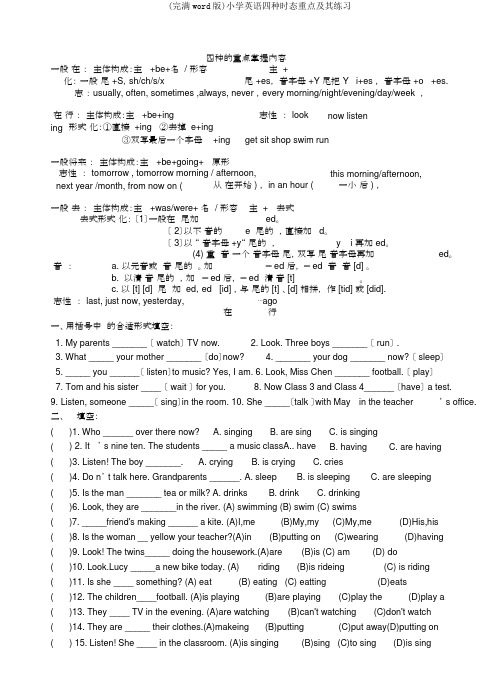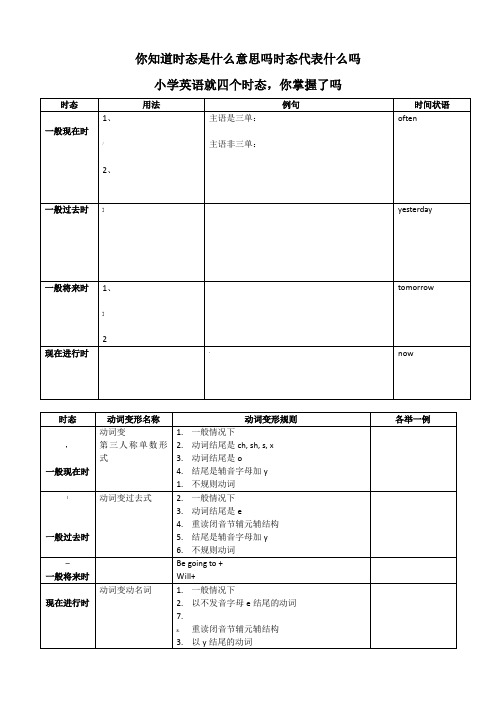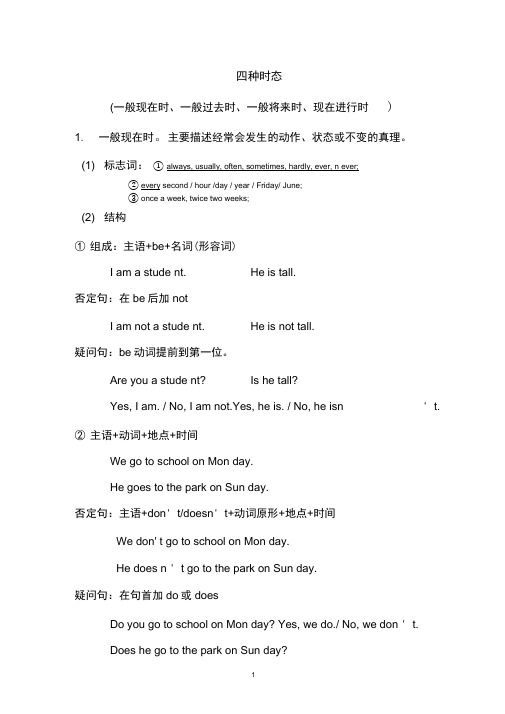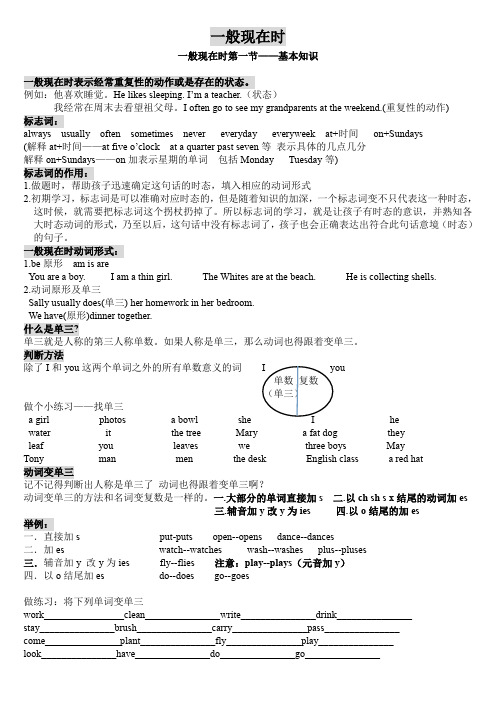小学英语四种时态的综合讲解和练习.docx
小学六年级英语四大时态总复习练习.docx

小学英语四种时态复习一提到时态,就必然用到动词。
首先要明确两个概念:动词有五种形式,即:原形(形式),第三人称单数(形式),过去式(形式),现在分词(形式),过去分词(形式)。
小学阶段,句子有以下四种常见时态,即:一般现在时态;一般过去时态;般将来时态;现在进行时态。
式,意思就是各种不同的形式,是对应着动词来说的;时态,意思就是表达各种不同的时间的事情,是对应着句子来说的。
式与时,先搞懂区别。
一、一般现在时态一般现在时用法口诀一般现在时,every, usually, often, sometimes.第一、二人称和复数,动词原形不变换。
除了I, you ,复数外,动词后加s(es别忘怀。
要变一般疑问句,be动词提前很容易。
若是没有be动词,Do和Does开头要注意。
否定句,很简单,not在be动词后面站。
若是没有be动词,do, does加not要牢记。
请把这些规律记,一般现在时没问题。
一般现在时态,可能是两种意思。
第一,表示经常性的动作,常与often, sometimes, usually, every day, every week, every mon th, every year等表示频率的副词连用。
例如:He often goes swimming in summer.I usually go to work by bike.Sam visits China every year.第二,表示现在的状态。
如:My mother is a worker.There is a computer in our classroom.注意问题:be (am, is, are)动词就是独立的谓语动词,一个句子中有了be(am, is, are)就有了谓语动词了。
句子中不能同时出现两个谓语动词。
不少同学经常出这样的错误:The boy is often eats hamburgers(. 错) 应改为:The boy often eats hamburgers.二、现在进行时态正在进行时态口诀现在分词用途多,进行时态不用说。
(完整word版)小学英语四种时态重点及其练习

四种的重点掌握内容一般在:主体构成:主 +be+名 / 形容主 +化:一般尾 +S,sh/ch/s/x尾 +es,音字母 +Y 尾把 Y i+es ,音字母 +o +es.志: usually, often, sometimes ,always, never ,every morning/night/evening/day/week ,在行:主体构成:主 +be+ing志性: look now listening形式化:①直接 +ing ②去掉 e+ing③双写最后一个字母+ing get sit shop swim run一般将来:主体构成:主 +be+going+ 原形志性: tomorrow , tomorrow morning / afternoon,this morning/afternoon,next year /month, from now on (从在开始 ) , in an hour (一小后 ) ,一般去:主体构成:主 +was/were+ 名 / 形容主 +去式去式形式化:〔1〕一般在尾加ed。
〔 2〕以不音的 e 尾的,直接加 d。
〔 3〕以“ 音字母 +y“ 尾的,y i 再加 ed。
(4) 重音一个音字母尾,双写尾音字母再加ed。
音: a. 以元音或音尾的。
加— ed 后,— ed 音音 [d] 。
b. 以清音尾的,加— ed 后,— ed 清音 [t]。
c. 以 [t] [d] 尾加 ed,ed [id] ,与尾的 [t] 、[d] 相拼,作 [tid] 或 [did].志性: last, just now, yesterday,⋯ago在行一、用括号中的合适形式填空:1. My parents _______ 〔 watch〕 TV now.2. Look. Three boys _______ 〔 run〕 .3. What _____ your mother _______ 〔do〕now?4. _______ your dog _______ now? 〔 sleep〕5. _____ you ______〔 listen〕to music? Yes, I am.6. Look, Miss Chen _______ football. 〔 play〕7. Tom and his sister ____ 〔 wait 〕 for you.8. Now Class 3 and Class 4______ 〔have〕 a test.9. Listen, someone _____〔 sing〕in the room. 10. She _____〔talk 〕with May in the teacher’ s office.二、填空:()1. Who ______ over there now? A. singing B. are sing C. is singing() 2. It ’ s nine ten. The students _____ a music classA.. have B. having C. are having()3. Listen! The boy _______. A. crying B. is crying C. cries()4. Do n’ t talk here. Grandparents ______. A. sleep B. is sleeping C. are sleeping()5. Is the man _______ tea or milk? A. drinks B. drink C. drinking()6. Look, they are _______in the river. (A) swimming (B) swim (C) swims()7. _____friend's making ______ a kite. (A)I,me(B)My,my(C)My,me(D)His,his()8. Is the woman __ yellow your teacher?(A)in(B)putting on(C)wearing(D)having()9. Look! The twins_____ doing the housework.(A)are(B)is (C) am(D) do()10. Look.Lucy _____a new bike today. (A)riding(B)is rideing(C) is riding()11. Is she ____ something? (A) eat(B) eating(C) eatting(D)eats()12. The children____football. (A)is playing(B)are playing(C)play the(D)play a()13. They ____ TV in the evening. (A)are watching(B)can't watching(C)don't watch()14. They are _____ their clothes.(A)makeing(B)putting(C)put away(D)putting on() 15. Listen! She ____ in the classroom. (A)is singing(B)sing (C)to sing(D)is sing三、按要求进行句型变换:1.Look! Lily is dancing. 〔改一般疑问句〕_________________________________________2.Kate is looking for her watch. 〔改否认句〕 ________________________________________3.Mrs. White is watching TV 〔. 划线提问〕 _________________________________________4.I am doing homework. 〔改否认句〕 __________________________________________5. They are waiting for you at the library.〔划线提问〕_____________________________一般将来时一、选择题() 1.There ____ a meeting tomorrow. A. is going to be B. will go to be()2.Charlie___here next month. A. won’ t workB. working C. isn’ t going to working ()3. He ___ busy this week A. will be B. is; C. will be; D. is()4.There ____a football match tomorrow. A. was B. is going to have C. will have()5. ____ you ___ free tomorrow? Are; going to B. Are; going to be C. Are; going to()6. Mother ___ me a present on my next birthday. A. will gives B. will give C. gives ()7. He _____ her a hat on her next birthday. A. gives B. will giving D. is going to give ()8. He _____ to us as soon as he gets there. A. writes B. has written C. will write()9. He _____ in three days. A. came back B. will come back C. is going to coming back ()10.We ____the work this way next time. A. do B. will do C. going to do D. will doing()11.Tomorrow he ____a kite in the park. A. will flys; B. will flying C. is going to fly;()12.tomorrow they ___a volleyball match. A. will watching B. watches C. is watching()13.They _____ a party tomorrow. A.are having B.are going to have C.will having()14. ___ you ____free next Sunday? A. Will; are B. Will; be C. Do; be D. Are; be ()15. He ________ there at ten tomorrow morning. A. will B. is C. will be D. be二句型变换1.Nancy is going to go camping. 〔改否认〕 Nancy ________ going to go camping.2.I ’ ll go and join them〔.改否认〕 I _______ go ______ join them.3.I ’ m going to get up at 6:30 tomorrow〔.改一般疑问句〕________ _______ ________ to get up at 6:30 tomorrow?4.We will meet at the bus stop at 10:30. 〔改一般疑问句〕_______ ________ meet at the bus stop at 10:30.5.She is going to listen to music after school. 〔对划线局部提问〕________ _______ she ________ ________ _________ after school?6.My father and mother are going to see a play the day after tomorrow.( 同上 )_________ _________ going to see a play the day after tomorrow.7.Today is a sunny day. We _______ (have) a picnic this afternoon.8.My brother _____(go) to Shanghai next week.9.Tom often _____ (go) to school on foot. But today is rain. He ______(go) to school by bike.10.What do you usually do at weekends? I usually____(watch) TV and ______(catch) insects?11.What ________(do) you do last Sunday? What _______(do) next Sunday?12.Mary _____ (visit) her grandparents tomorrow一般现在时一 . 用所给动词的合适形式填空:1. Mike__________ (like) cooking. 2. She__________ (go) to school from Monday to Friday. 3. He often_______ (have) dinner at home. 4. Daniel and Tommy _______ (be) in Class One.5.There_____ (be) some water in the bottle.6. Don ’t make a noise. Grandpa __________(sleep).7.It ’ s seven now, Tom ’ s family__________(watch). TV8.It ________(take) me two hours to finish my homework last night.9.She often_______(wash) clothes in the evening.10.She______ (don’ t do) homework everyday. 11. The girl______ (teach) English on Sundays.12.There ________ (be) a football match on TV this evening.13.Your parents__________ (read) newspapers every day.14.What they often__________ (do) on Saturdays? 15. We ______ (not watch) TV on Monday.16. they__________ (like) the World Cup.17. Nick________ (not go) to the zoo on Sunday.18.Liu Tao__________ (do) not like PE.19.Jenny and Danny usually______(play) games in the afternoon .二.单项选择:1.Jenny____ English every evening. A has study B studies C study D studied2.Wang Mei ____ music and often ____ to music. A like; listen B likes; listens C like; are listeningD liking ; listen3.The picture _______ nice. A. looks B. is looked C. look D. is looking4.He ______ a good friend. A. having B. have C. to have D. has5.One of the boys_____ a black hat. A have B there is C there are D has三、依照要求改写句子1.Daniel watches TV every evening.( 改否认句 ) ______________________________________2.I do my homework every day.( 改一般疑问句 ) ________________________________3.She likes milk.( 改为一般疑问句 ) ____________________________________________4.Amy likes playing computer games.( 改一般疑问句 )________________________________5.We go to school every morning.( 改否认句 )_____________________________________6.He speaks English very well.( 改否认句 )________________________________________7.I like taking photos in the park.( 划线提问 )_________________________________________8.John comes from Canada.(划线提问 )_____________________________________________9. She is a good student.(改一般疑问句否认答复)____________________________________10.Simon and Daniel like going skating.( 否认句 )___________________________________一般过去时一、用动词的合适形式填空。
小学英语四大时态总结及练习题

你知道时态是什么意思吗时态代表什么吗小学英语就四个时态,你掌握了吗你能发现它们之间的共同点和不同点吗勤加练习,百战不殆I.把下列动词变为第三人称单数形式。
1. clean--2. go--3. have--4.do-6. fly--7. come-- brush-9. watch-- 10. study-- 11. ask--(13. swim-- 14. catch-- 15. write--16. eat-- 17. make-- 18. paint—19. learn-- 20. phone-- 21. run—22. hop-- 23. sing-- 24. pick—II.把下列动词变成过去式is\am________ fly______ plant________are________ drink_________ play_______go________ make ______ does_________dance________ worry________ ask _____ taste_________ eat__________ draw________put ______ throw________kick_________ pass_______ do ________III.把下列动词变成动名词形式。
Wake________ make__________ come____________have____________!Take_________ leave__________ rid_________, regret__________, Begin________,cut________, get_________, hit_________, run_________, set_________, sit__________, spit__________, stop_________, swim________,beg_________, drop__________, fit_________, nod_________, dig___________, forget_________, travel_________visit_________Carry_________ enjoy___________ play ___________ study ________die_________ lie_________多加练习,百战不殆之时态篇一、用单词的正确形式填空:1.Mike _________ (do) his homework every day.2.There __________(be) some water in the glass.3.We like ________ (play) basketball after class.4.I like singing. I often _________(listen) to the music in the evening.5.【6.My grandma_________(watch) TV every day.二、判断句子的正误, 并改正。
小学英语四大时态总结(附小升初时态考题)

4. 以o结尾的单词: 有生命加s 。
tomato-tomatoespotato-potatoes无生命加espiano-pianosphoto-photoszoo-zoosradio-radios小升初时态专题综合训练1.(成都市青羊区小学毕业卷)John _____ football.A. likes playingB. likes playC. like play2.(深圳市龙岗区小学毕业卷)Does your mother _____ football?A. likeB. likesC. like play3.(芜湖市第三中学招生卷)They usually _____ TV in the evening.A. watchB. will watchC. are watchingD. watches4.(上海市奉贤区小学毕业卷)—What do you usually do on the weekend?—I often ____.A. do my homeworkB. did my homeworkC. doing my homework5. (杭州市西湖区小学毕业卷)I don’t like _____ thril lers(恐怖片)______ playing baseball.A. watching; orB. watching; andC. to watch; or6.(菏泽市晨曦中学招生卷)Bob often _____ to school.A. walkB. walksC. walked7.(南昌铁路一中初中部招生卷)My pen ______ on my desk ten minutes ago.But it _____ there now.A. is; isn’tB. was; isn’tC. is; is8.(长沙市宁乡县小学毕业卷)Mike is _____ after his classmates.A. runsB. runingC. running9.(桂林市奎光学校招生卷)Be quiet! The babies ________.A. sleepB. are sleepingC. slept10. (武汉市青山区小学毕业卷)______ he _____ his homework yesterday?A. Does; doB. Did; didC. Did; do11(北京市朝阳区小学毕业卷)—What did you do last weekend?—I ______.A. go swimmingB. did my homeworkC. went swim12.(芜湖市第十一中学招生卷)—What’s your hobby?—_____ is my hobby.A. Collecting stampsB. Collect stampsC. Stamps13.(广州市白云区小学毕业卷)—Where were you just now?—I _____ at school.A. isB. wasC. were14.(武汉市青山区小学毕业卷)______ he ______ his grandparents lastmonth?A. Did; visitedB. Did; visitC. Do; visited15.(郑州市二七区小学毕业卷)Last week, we _____ a _____ race.A. hard; runningB. have; runningC. had; running16.(福州市仓山区小学毕业卷)I______ to the park last week.A. goB. wentC. going17.(合肥市蜀山区小学毕业卷)If I _____ you tomorrow, I will give youthe receipt(收据)。
小学英语时态讲解及练习可直接.docx

小学英语语法【一】一般现在时一般现在时基本用法介绍一、一般现在时的功能1.表示事物或人物的特征、状态。
如:The sky is blue.天空是蓝色的。
2.表示经常性或习惯性的动作。
如:I get up at six every day.我每天六点起床。
3.表示客观现实。
如: The earth goes around the sun.地球绕着太阳转。
一般现在时用法练习一、出下列动词的第三人称单数drink ________ go _______ stay________ make ________look _________ have_______ pass_______ carry ____ come________ watch______ plant_______fly ________study_______ brush________ do______ teach_______ likeplay read wash be二、用括号内动词的适当形式填空。
1.He often ________(have) dinner at home.2.Daniel and Tommy _______(be) in Class One.3.We _______(not watch) TV on Monday.4.Nick _______(not go) to the zoo on Sunday.5.______ they ________(like) the World Cup?6.What _______they often _______(do) on Saturdays?7._____ your parents _______(read) newspapers every day?8.The girl _______(teach) us English on Sundays.9.She and I ________(take) a walk together every evening.10.There ________(be) some water in the bottle.11.Mike _______(like) cooking.12.They _______(have) the same hobby.13.My aunt _______(look) after her baby carefully.14.You always _______(do) your homework well.15.I _______(be) ill. I’m staying in bed.16.She _______(go) to school from Monday to Friday.17.Liu Tao _______(do) not like PE.18.The child often _______(watch) TV in the evening.19.Su Hai and Su Yang _____(have) eight lessons this term.20. - What day _____(be) it today?-It’s Saturday.三、按照要求改写句子2.I do my homework every day.(改为一般疑问句,作否定回答)_____________________________________________________3.She likes milk.(改为一般疑问句,作肯定回答)__________________________4.Amy likes playing computer games.(改为一般疑问句,作否定回答)___________________________________6.He speaks English very well.(改为否定句)_______________________________________________7.John comes from Canada.(对划线部分提问)_______________________一般现在时练习1. He often(have) dinner at home.2. Daniel and Tommy(be) in Class One.3. We(not watch) TV on Monday.4. Nick(not go) to the zoo on Sunday.5.they(like)the World Cup?6. What they often(do) on Saturdays?7.your parents(read)newspapers every day?8. The girl(teach)us English on Sundays.9. She and I(take) a walk together every evening.10. There(be) some water in the bottle.小学英语语法【二】现在进行时现在进行时1.现在进行时表示现在正在进行或发生的动作,也可表示当前一段时间内的活动或现阶段正在进行的动作。
(完整版)四种时态及其练习(完整版)

四种时态(一般现在时、一般过去时、一般将来时、现在进行时)1. 一般现在时。
主要描述经常会发生的动作、状态或不变的真理。
(1) 标志词:① always, usually, often, sometimes, hardly, ever, n ever;②every second / hour /day / year / Friday/ June;③once a week, twice two weeks;(2) 结构①组成:主语+be+名词(形容词)I am a stude nt. He is tall.否定句:在be后加notI am not a stude nt. He is not tall.疑问句:be动词提前到第一位。
Are you a stude nt? Is he tall?Yes, I am. / No, I am not.Yes, he is. / No, he isn ' t.②主语+动词+地点+时间We go to school on Mon day.He goes to the park on Sun day.否定句:主语+don' t/doesn' t+动词原形+地点+时间We don' t go to school on Mon day.He does n ' t go to the park on Sun day.疑问句:在句首加do或doesDo you go to school on Mon day? Yes, we do./ No, we don ' t.Does he go to the park on Sun day?Yes, he does./ No, he does n (3) 动词三单变化:① 在原单词末尾加s ,如:like - likes② 单词以 o, sh, ch, s, x 结尾力口 es,女口: go - goes ③ 单词末尾为辅音+y 结尾去y 加ies 女口: study- studies 2.现在进行时:主要叙述正在发生的事情。
小学四大时态知识点讲解以及四大时态综合训练题

一般现在时一般现在时第一节——基本知识一般现在时表示经常重复性的动作或是存在的状态。
例如:他喜欢睡觉。
He likes sleeping. I’m a teacher.(状态)我经常在周末去看望祖父母。
I often go to see my grandparents at the weekend.(重复性的动作)标志词:always usually often sometimes never everyday everyweek at+时间on+Sundays(解释at+时间——at five o’clock at a quarter past seven等表示具体的几点几分解释on+Sundays——on加表示星期的单词包括Monday Tuesday等)标志词的作用:1.做题时,帮助孩子迅速确定这句话的时态,填入相应的动词形式2.初期学习,标志词是可以准确对应时态的,但是随着知识的加深,一个标志词变不只代表这一种时态,这时候,就需要把标志词这个拐杖扔掉了。
所以标志词的学习,就是让孩子有时态的意识,并熟知各大时态动词的形式,乃至以后,这句话中没有标志词了,孩子也会正确表达出符合此句话意境(时态)的句子。
一般现在时动词形式:1.be原形am is areYou are a boy. I am a thin girl. The Whites are at the beach. He is collecting shells.2.动词原形及单三Sally usually does(单三) her homework in her bedroom.We have(原形)dinner together.什么是单三?单三就是人称的第三人称单数。
如果人称是单三,那么动词也得跟着变单三。
判断方法除了I和you这两个单词之外的所有单数意义的词I you单数复数(单三)做个小练习——找单三a girl photos a bowl she I hewater it the tree Mary a fat dog theyleaf you leaves we three boys MayTony man men the desk English class a red hat动词变单三记不记得判断出人称是单三了动词也得跟着变单三啊?动词变单三的方法和名词变复数是一样的。
(word版)小学英语时态总结及练习题终版【精】,文档

四大时态总结及练习你知道时态是什么意思吗?时态代表什么吗?小学英语就四个时态,你掌握了吗?时态用法、表示事物或人物的般现在特征、状态。
时2、表示经常性或习惯性的动作。
3.表示客观现实。
例句时间状语主语是三单:Theskyisblue. often Hegetsupatsixeveryday.主语非三单:Theballoonsareblue. Igetupatsixeveryday.一般过去表示过去某个时间发Wereyouatschooljustnow?yesterday时生的动作或存在的状WhatdidJimdoyesterday?态。
一般将来1、表示将要发生的动Iwillgotoschooltomorrow.tomorrow时作或存在的状态。
2及打算、方案或准备I’mgoingtohaveapicnicthisafternoon.做某事。
现在进行现在进行时表示现在Areyousleeping?now时正在进行或发生的动Whatareyoudoing?作。
时态动词变形名称动词变形规那么各举一例主语为第三人1.一般情况下cook 称单数时,动词2.sh,ch,s,x,o结尾washdo一般现在变三单3.结尾是辅音字母加y study时4.不规那么动词have动词变过去式1.一般情况下pull2.动词结尾是e taste一般过去3.重读闭音节辅元辅结构stop时4.结尾是辅音字母加y study5.不规那么动词be,see,get等等一般将来begoingto+时will+动词变动名词1.一般情况下cook现在进行2.以不发音字母e结尾的动词make时3.重读闭音节辅元辅结构run,swim英语语法中的时态〔tense〕是一种动词形式,不同的时态用以表示不同的时间与方式。
是表示行为、动作、状态在各种时间条件下的动词形式多加练习,百战不殆之时态一、选择最正确的答案:oftenplaythepiano?No,she_____.A.Do;do B.Does;doesC.Does;doesn 'tyourpenpal__inBeijing?A.Do;li veB.Do;livesC.Does;live3.TomandMike__veryexcited,theywilltakeatrip.A .is B.areC.amlike________verymuch.Whataboutyou?A.dance B.danced C.dancing kite____abird.A.looklike B.islookingC.look slikeandI___goodfriends.A .is B.areC.amoften___hishomeworkonSundays.A.doB.does C.did8.Whatdoyouusuallydoontheweekend?I__________.A .wentswimming B.goswimmingC.visitedgrandparentsdoyouusuallydoonyourholiday?Iusually__________.A.sawelephantsB.singanddance picture ____astudent.Igotoschool____buseveryday.A.is;by B.am;on C.am;by ____abrother.She____asister.A.have; hasB.has;has C.have;have____astudent.He____ateacher.A.is ;isB.are;is C.are;arealways_____footballgames.A.watches B.watch C.doesn't bestfriend_____shells.A.colle ctsB.collect C.often15.Shedoesn’t_____listeningtothemusic.A.of tenB.likeC.likesmotherandI___alwayswatchromanticfilms.A.do esn’t B.don’tC.do_____heusuallygethomeonFriday?----HeusuallygetshomeatfouronFriday.A.doB.doesC.did18,.Summer_________spring.A esafterBesin beforeone____totheirteacherintheclassroom.listenin g B.islistening C.listenaresingingand___togetheratthepartynow.A.daB.dancedC.dancingnce21.Listen!Thebirds____.A.issinging B.aresing C.aresinging22.Look!Thekite___inthesky.A .flyB.fliesC.isflying____ridingaforse.A.is B.areC.a m____playingchess.A .amB.is C.areyouwashingclothes?A.Yes,youareB.Yes,Iam C.No,Iamhe____TV?Yes,heis.A.wat chB.watchingC.nottheytakingpictures.?Yes,theyare.A.AmB.Be C.Are2 8.It’s10o’clock.Ben_____TVinthe bedroom.A.wat chB.iswatching C.watches___presentsformyparentsyesterday.A.buy edB.bought C.buying30.Susan_____swimmingyesterday.A .goB.goes C.went31.Danny_____breakfastfivetimeslastweek.B.ate C.eatedSunday____TreePlantingDay.A B.wereC..is was____alotfromourtextbook.A.lea rnedB.learnesC.learning____tothezooand___alotofanimalsyesterday.A.go; seeB.went;saw C.goes;seesdidyoudolastweekend?--I_________A.readabo okB.washtheclothes C.gofishingdidyoudoonyourholiday?I________A.boughtapresen tB.goskiing C.learnEnglishdidhe_____yesterday?He____hishomework.A.did ;didB.do;didC.do;domypresentsandI____ourhouse.A.werecleaningB.cleanedC.aregoingtoclean _____totreesinthedifferentseasons?A.hap penB.happens C.happenedsummer.I____inthelakeandplayedonthebeach.A.swi mB.swamC.willswim41.DidyoueatgoodfoodinChina?______.A.Yes,IdoB.No,Ididn’tC.No,Ididplayedbasketball_____.A.sometim esB.onSaturdays stSaturday43.I’mgoingto___somechopsticks___Sundayafternoon.A.bought; onB.buy;on C.buy;onare yougoingtoHongKong?I’mgoingthere____.A.thisweekendB.byplane C.yesterday45.I’mgoingto____myfriendsthisweekend.A.visit B.visited C.visiting46.I’m goingto____homeworktomorrow.A.d oesB.doC.didyougoingtotakeapianoclass?____A.No,wenotB.No,Iam C.Yes,Iamam___eatbreakfastat7:15.A.will B.goingtoC.sh allaregoingto____totheparktomorrow.A.g oB.goes C.goingfilmareyougoingto______?A.s eeB.watch C.look_____aplaytomorrow.Willyoupleasejoinus?A.aregoingtoseeB.saw C.sees___aracewithMingMing.A.shallhaveB.willhave C.goingtohave_____yougotomorrow?A.a reB.willC.shallhisbrothergoingtoclimbmountains?A.I sB.Are C.Am55.Look!It_____.A.willsnowi ngB.isgoingtosnow C.snows____freethisafternoon.A.b eB.willbeC.goingtobewill____roastducksinBeijing.B.eats C.eat__visitmyfriendsthisweekend.A.goto B.amgoingto C.goingto二、按照要求改写句子1.DanielwatchesTVeveryevening.(改为否认句)___________________________________________________2.Idomyhomeworkeveryday.(改为一般疑问句,作否认答复)________________________________________________________3.Shelikesmilk.(改为一般疑问句,作肯定答复)___________________________4.Amylikesplayingcomputergames.(改为一般疑问句,作否认答复) ___________________________________________________5.Iliketakingphotosinthepark.(对划线局部提问)________________________________________________________6.JohncomesfromCanada.( 对划线局部提问)___________________________________________________isgoingtogocamping. 〔改否认〕Nancy________goingtogocamping.I’llgoandjointhem〔.改否认〕I_______go______jointhem.I’mgoingtogetupat6:30tomorrow〔.改一般疑问句〕_______________________togetupat6:30tomorrow?Wewillmeetatthebusstopat10:30.〔改一般疑问句〕_______________meetatthebusstopat10:30.Sheisgoingtolistentomusicafterschool.〔对划线局部提问〕_______________she_________________________afterschool?5.Myfatherandmotheraregoingtoseeaplaythedayaftertomorrow.(__________________goingtoseeaplaythedayaftertomorrow.同上) 1.Therewasacarinfrontofthehousejustnow.否认句:________________________________________________一般疑问句:____________________________________________肯、否认答复:__________________________________________肯、否认答复:__________________________________________一.按要求改写句子2.Theboyisplayingbasketball.否认句:____________________________一般疑问句:_________________________肯定答复:__________________________否认答复:__________________________对“isplayingbasketball提问:〞__________________________对“Theboy提〞问:__________________________9.Theyaresingingintheclassroom.10.否认句:____________________________11.一般疑问句:_________________________12.肯定答复:__________________________13.否认答复:__________________________14.对“aresinging提问〞:__________________________15.对“intheclassroom提问〞:__________________________16.三、用括号内动词的适当形式填空。
- 1、下载文档前请自行甄别文档内容的完整性,平台不提供额外的编辑、内容补充、找答案等附加服务。
- 2、"仅部分预览"的文档,不可在线预览部分如存在完整性等问题,可反馈申请退款(可完整预览的文档不适用该条件!)。
- 3、如文档侵犯您的权益,请联系客服反馈,我们会尽快为您处理(人工客服工作时间:9:00-18:30)。
般将来时:定义:一般将来时表示将来某一时刻的动作或状态,或将来某一段时间内经常的动作或状态。
构成:(1) be going to +动词原形(2) will + do用法:1)表示将来的动作或状态一般将来时常与一些表示将来的时间状语连用,女htomorrow (明天), next week (下周), from now on (从现在开始);in the future (将来);someday (未来的某一天)等。
2)表示将来经常发生的动作ril teach you English every Wednesday next month.★★★“be going to+动词原形"表示即将发生的或最近打算进行的事。
例如: ©It is going to rain.要下雨了。
②We are going to have a meeting today. 今天我们开会。
Step Three: Do Some Exercise一、用will或will not以及括号中的动词完成句子1、I______________________ a Chinese song.(sing)2、S ally ____________________ the tennis match.(not win)3、Y ou _____________________ the one-day trip to Guangzhou.(enjoy)4、F lora ____________________ at home this weekend.(not stay)二、用括号内的词和be going to完成问答1、(when/we/ have dinner? We / it / at seven o'clock)A When are we going to have dinner?B We are going to have it at seven o'clock.2、(Where / you /meet your friends? We / them /at the school gate)A _________________________________________B _________________________________________3、(you and Ling / play football/ today? No / we/ table tennis)AB现在进行时一般过去时be+动词ingo 动词+ed一般将来时be going to+实义动词原形;一般现在时动词变化用动词原形,主语是第三人称单数时,动词要加s/es。
一般现在时主语是第三人称单数时,动词要加s/es。
动词+S的变化规则1.一般情况下,直接加・s,如:cook-cooks, milk-milks2.以s. x. sh・ ch. o 结尾,力n-es,女u: wash-washes, watch-watches, go-goes3.以''辅音字母+y"结尾,变y为i,再加・es,如:study-studies;现在进行时动词加ing的变化规则1)一般情况下,直接加ing,如cook-cooking2)以不发音的e 结尾,去e 加ing,如:make-making, taste-tasting3)如果末尾是一个元咅字母和一个辅咅字母,双写末尾的辅咅字母,再加ing, 如1: run-running, stop-stopping,swim-swimming动词过去式变化规则:1)一般在动词末尾加・ed,女n: pull-pulled, cook-cooked2)结尾是e 加d,如I: taste-tasted3)末尾只有一个元音字母和一个辅音字母的重读闭音节,应双写末尾的辅音字母,再加・ed,如J: stop-stopped4)以“辅音字母+y”结尾的,变y为i,再加・ed,如:study-studied5)不规则动词过去式将来吋be going to+实义动词原形;标志一般现在时usually, often, every day, never , always, seldom , sometimes 等现在进行时:now , look, listen!等一般过去式:a moment ago, just now, yesterday, last…”等。
一般*各来时• tomorrow, next day(week, month, year...),练习:一、用be动词的适当形式填空1.1_____ an English teacher now.2.She _______ h appy yesterday.3.They _______ glad to see each other last month.4.Helen and Nancy ________ g ood friends.5.The little dog ____ two years old this yea匚6.Look, there _______ lots of grapes here.7.There _______ a sign on the chair on Monday..8.Today _____ t he second of June. Yesterday _______ the first of June. Children's Day. All the students _____ very excited・二、句型转换1.There was a car in front of the house just now.否定句:__________________________________________________般疑问句:______________________________________________肯、否定回答:___________________________________________肯、否定冋答:___________________________________________三、用行为动词的适当形式填空1.He_________ (live) in Wuxi two years ago.2.The cat ________ (eat) a bird last night.3.We _______ (have) a party last Halloween.4.Nancy ______ (pick) up oranges on the farm last week.5.1______ (make) a model ship with Mike yesterday.6.They ________ (play) chess in the classroom last PE lesson.7.My mother ______ (cook) a nice food last Spring Festival.8.The girls________ (sing) and _______ (dance) at the party.9.1____ (watch) a cartoon on Saturday-10.Her father ______ (read) a newspaper last night.11.We ________ to zoo yesterday, we _____ to the park, (go)12. _____ y ou _______ (visit) your relatives last Spring Festival?四种时态分类练习一般现在时练习题1. ____ Alice often play die piano. No, she ___________ .A. Do; do B. Docs; does C. Docs; docsifl2. _ your penfriend _ in Beijing? A. Do; live B. Do: lives C. Docs; live3, Tom and Mike _ ver}' cxciicd. they will take a (rip. A. is B. are G ani4.1 like _________ very much. What about you?A, dance B. danced C. dancing5.1 cair( find niv pvn. Lei me _ A go and ask her B, go and ask hers C. go and ask she6. Fangfang is a good student. She _____ n utlis. A. docs good at B. well do it C. is good at7. The kite ____ a bird. A. look like B. is looking C. looks like8. Bill and I _ good friends. is B. arc C. am9. Sandy often _ his homework on Sundays A do B. does C. did10. Whal do vou usually do on the weekend ? I .A. went swimmingB. go swimmingC. visited grandparents现在进行时练习题1. Every one ____ t o their teacher in the classr (x )nL 2 arc listening B. is listening C\ listen2. Tlicy arc singing and ___ (ogclhcr al the parly now. A. dance B. danced C. ehneing3. Listen! The birds ____ . A. is singing B. arc sing C. arc singing4. Look! The kite ___ in the sky. A. tly B. tlics C. is flying5. They ____ r iding a forse ・ A. is B. arc C. am一般过去式练习6. Ka (c ___ playing chess. A. am 1. Are you washing clothes? 八.Yes. you arc 8.1s he ____ TV? Yes, he is. A. watch 9. ____ they taking pictures.? Ye 久 dicy arc. 10. Ifs 10 o'clock. Ben B- is C. arcB. Yes 、I amC. No, I amB. watchingC. notA. An 】B. BeC. ArcTV in lhe bedroom. A. waich B. is watchingC. watches& Wliai film arc you going (o ______ ? A, B. watch C. look 9. We ____ a play tomorrow. Will you please join us? A. are going to sec10. He __ a race with Ming Ming- A. shall have B. will have C. going (0 have12. ___ bis brother going to climb niouiuains 9 A. Is B. Arc C. Am一、用动词的适当形式填空1. It _____ (be) the 2nd of November yesterday.Mr White _______ (go) to his office by car.2. Gao Shan _______ (put) the book on his head a moment ago.3. Doit ______ the house. Mum _______ it yesterday, (clean)4. What ____ y ou ______ just now? I ______ some housework, (do)5. They _________ (make) a kite a week ago.6.1 want to ______ a pples. But my dad _______ all of them last month, (pick)7. ______ he ______ the flowers this morning? Yes, he _____ . (water)8. She ___ (be) a pretty girl. Look, she _____ (do) Chinese dances.9. The students often ________ (draw) some pictures in the art room.10. What _____ Mike do on the farm? He ________ cows, (milk)11. It ______ (be) Ben's birthday last Friday.11 ■ Where you go tomorrow? A. arcB.willC. shall presents for my parents yesterday. A buyed R. bought C. buying B. goes C. wenLA. eat Be ateB. were B. kames Susan _____ swimming yesterday. A. goDanny ____ breakfast five times Iasi week.Lasl Sunday ____ T ree Plan ling Duy. A. isI ____ a lot from our textbook. A. learnedWe ____ t o die zoo and ____ a lot of animals yesterday. A. go; seeWhat did you do last weekend ? 一I _ What did you do on your holiday? I What did I K yesterday? He10. Ycslcrday my presents and I (\ eated C. was C. learning B. went; saw A. read a book B t wash (he clothes A. bought a present B. go skiing his homework. A. did; did B, do; did our house ・ A. were cleaning B. cleanedC. goes: sees C. go fishing C. Icjm English C. do ; doC. arc going to clean -般将来时练习Fm going to _____ some chopsticks _____ Sunday afternoon ・ A. bought: onB. buy; on C ・ buy ; on 2. When arc you going 【0 I Jong Kong 9 I'm going 〔here _____ • A. Ihis weekend B by plane ycslcrday 3. 「m going to ____ my friends tins weekend. 八.visitB. visitedC. visiting 4. Frn going (o ____ homework tomorrow. A. doesB. doC. did 5. Are you going to take a piano class? _____A. No, we notB. Xo, I amC. Yes. I am 6.1 am ___ cat breakfast al 7:15. A. willB. going [0C. shall 7. We are going to ____ to die park tomorrow. 2 go B. goes C. goingC. sees12.We all _____ (have) a good time last night.13.He ________ (jump) high on last Sports Day.14.Helen ________ (milk) a cow on Friday.15.She likes ______ n ewspapers, but she ______ a book yesterday, (read)16.He _______ f ootball now, but they _______ basketball just now. (play)17.Jim's mother ________ (plant) trees just now.18. ______ they ________ (sweep) the floor on Sunday? No, they _____ .19.1_____ (watch) a cartoon on Monday.20. We __________ (go) to school on Sunday.二、句型转换1.Su Hai took some photos at the Sports day.否定句:_________________________________________________ —般疑问句: _____________________________________________ 肯、否定回答: ___________________________________________ 2.Nancy went to school early.否定句:__________________________________________________般疑问句:______________________________________________ 肯、否定冋答: ___________________________________________ 3.We sang some English songs.否定句:__________________________________________________般疑问句:______________________________________________ 肯、否定回答: ___________________________________________。
